A Visit To Yushima Tenjin, The Shrine Of Scholars

We visit the temple that's popular with exam takers and students. Find out more about its history in this article.
There is a Japanese expression that there are yaorozu-no-kami, literally "eight million gods." The word yaorozu is used to signify "a great multitude." The saying originated because it has long been said that a god lives in everything. In actual shrines and temples across Japan, many different gods are worshipped.
The god of the lottery is worshipped at Hogihogi Temple, the god of electricity is worshipped at Horinji Dendengu, and at Myoutokuji, devotees say their prayers to the god of the toilet.
Whatever the temple, there is a reason and a history behind its choice of god; the people who visit are granted a specific blessing from that temple. This time, we will introduce Yushima Tenjin (Yushima Temmangu) located in Yushima in Tokyo. It is famous in Japan as the temple of the god of learning.
Test Takers Gather At Yushima Tenjin Every Year
In Tokyo, Yushima Tenjin is a model Temmangu shrine. Temmangu shrines are devoted to Sugawara-no-Michizane, or Tenjin, the god of learning. As such, during test-taking season, many students visit to pray for successful results.
Also, in February and March, plum blossoms bloom on the temple grounds, so it is well-known as a place where many people gather for flower viewing.
We will introduce you one-by-one to the areas at Yushima Tenjin, which are quite rich in history.
Front Torii Gate
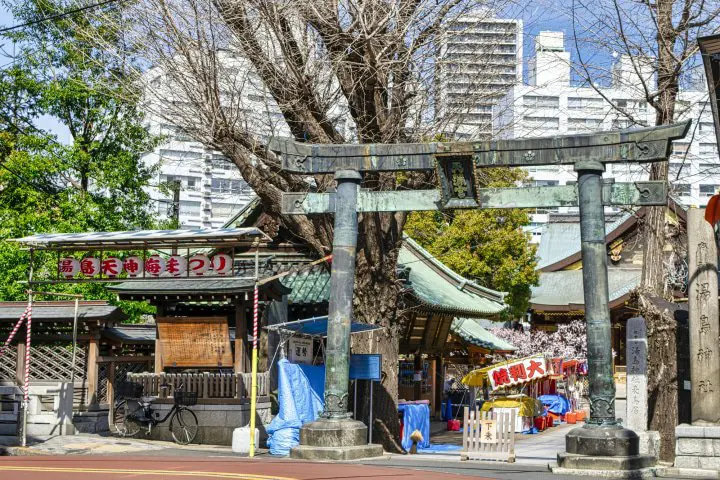
This torii gate is the front entrance to Yushima Tenjin. Built entirely out of copper, it is marked as having been made in 1667. Since the gate is extremely old, it has had its share of repairs over the years. Recognized for its historical and cultural value, it was designated as a Tokyo Tangible Cultural Property in October 1970.
Sanctuary
This is the sanctuary, which houses precious cultural assets and treasures. It is decorated with invaluable objects like mikoshi (portable shrines) and ancient illustrations.
The Rubbing Cow
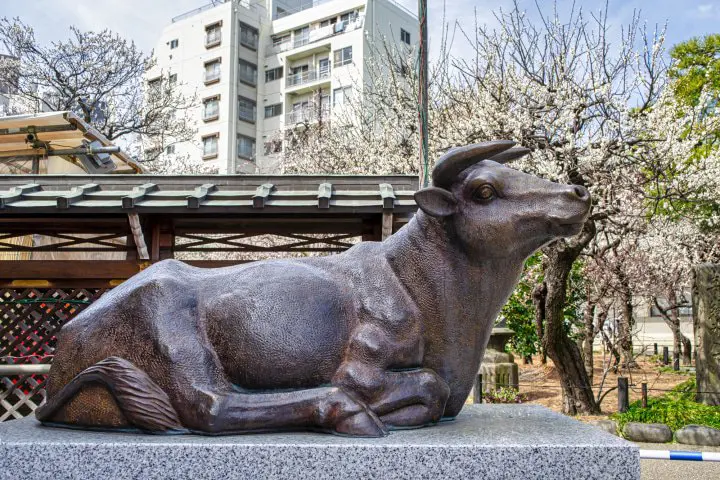
There is a stone statue of a cow on the grounds of Yushima Tenjin. Why, you ask?
The god Tenjin (Sugawara-no-Michizane) has various legends attributed to him that relate to cows. One example is that when he died, he left a final request: for his body to be placed on a cow, and for the cow to be allowed to wander wherever it so chose. The cow entrusted with Tenjin's body mutely walked east, to the vicinity of a temple known as Anrakuji, and stopped moving. It is said that Anrakuji became Sugawara-no-Michizane's final resting place.
There are a great number of other anecdotes about Tenjin that are connected to cows. For this reason, cow statues exist at Temmangu shrines all over Japan, including Yushima Tenjin.
At Yushima Tenjin, it is a common sight to see shrine visitors at the cow statue, rubbing its horns or facing it while clasping their hands in prayer. At some point it became customary to rub the statue's nose or feet to heal the same body part on one's own body, so now it is known as the rubbing cow, and people have faith in its powers.
Main Shrine
The main shrine is made from cypress trees from Kiso (※1), said to have been 250 years old at the time.
(※1) Kiso - An area in present-day Nagano prefecture.
It also features a very large triangle-shaped roof. Thanks to the conspicuous size of the roof, the building has an imposing silhouette.
Written Oracles (Omikuji)
Like most other temples in Japan, you can draw omikuji at Yushima Tenjin.
The container for the omikuji is made of seasoned wood. After you draw an omikuji, either take it home with you or tie it up in the designated space.
Ema
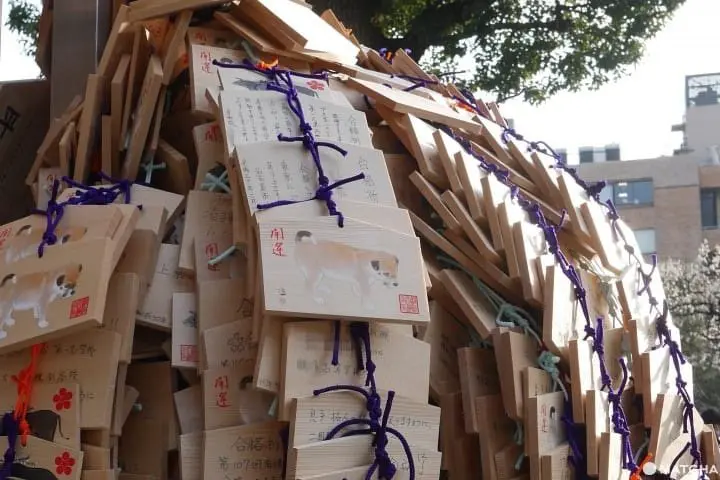
At Yushima Tenjin, where the god of learning hears prayers, people write the names of the high school or university they wish to get accepted to, or the name of the test they wish to pass, on wooden plaques known as ema. When the vow is fulfilled, they then return to Yushima Tenjin to express their gratitude to the god.
The temple is famous in Japan, so many different people come to visit it every day. Since it is very close to Ueno Station and Shinobazu Pond, why not drop by when you're in the area?
At Yushima Tenjin, you can experience some unique Japanese culture and rub some history too.
Hello, I'm Keisuke. living Asakusa Tokyo Japan. Love triathlon(Ironman), traveling, reading, eating and my job. I really really like Japan but I think Japan should be more kindly to traveler. https://www.facebook.com/keisukeyamada84







































![[Niigata] Skiing and snowboarding are just not enough! Fun snow spots for parents and children](https://resources.matcha-jp.com/resize/720x2000/2026/01/29-256901.webp)
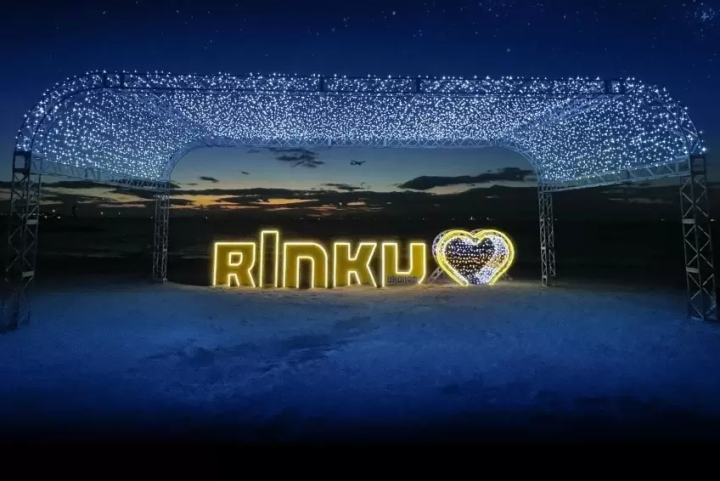
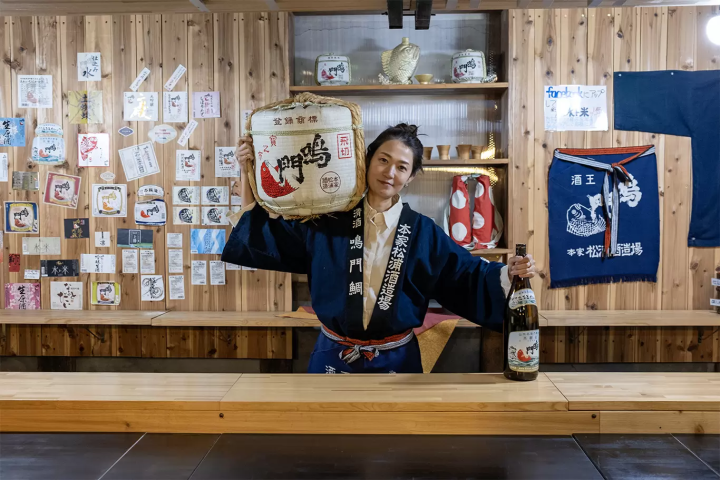
![[Gunma, Nakanojo] Experience Japanese history in a wooden school building from the Meiji era](https://resources.matcha-jp.com/resize/720x2000/2025/12/25-254022.webp)
